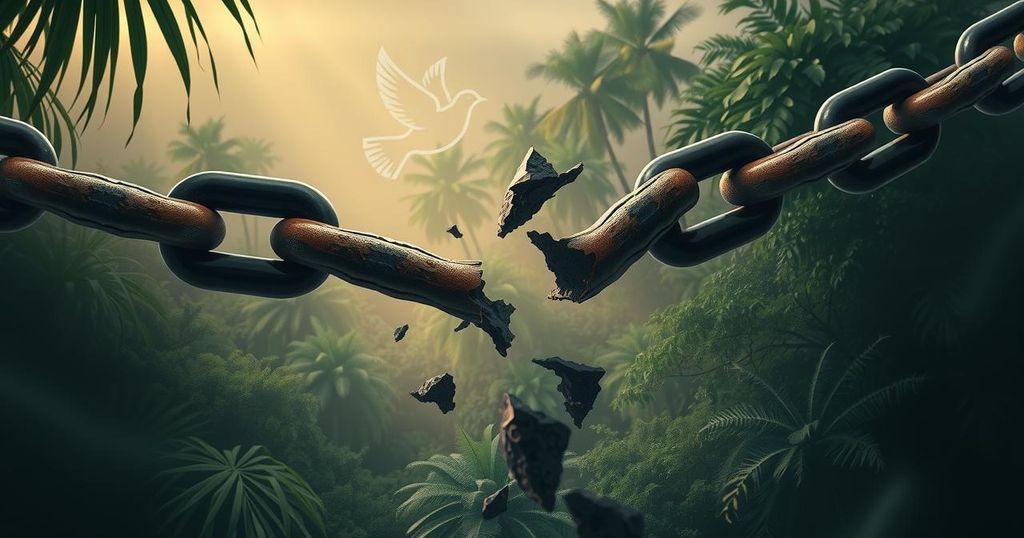Recent clashes in Goma, DRC, have led to increased accusations against Rwanda for supporting M23 rebels, with UN reports confirming Rwandan military involvement. Protests have erupted in Kinshasa, while historical tensions linked to the Rwandan genocide complicate the political landscape. The M23’s control over crucial resources has intensified the struggle for power, raising concerns about the impact of foreign military presence in the region.
Recent protests in Kinshasa, Democratic Republic of Congo (DRC), have seen citizens burning images of Rwandan President Paul Kagame amid accusations of his support for the M23 rebel group, which has taken control of Goma. A United Nations report confirms that the Rwandan army plays a significant role in M23 operations, overseeing their training and providing advanced weaponry. Goma, strategically located and rich in minerals, has a population that surged to around two million due to conflict between M23 fighters and the Congolese army.
The violence escalated recently, leading to loud explosions and widespread chaos, with reports of bodies in the streets and disrupted communication services. The UN peacekeeping chief, Jean-Pierre Lacroix, has expressed evidence of Rwandan troops aiding M23, complicating the already volatile situation in Goma, which is vital for trade and humanitarian efforts. Meanwhile, President Kagame continues to deny allegations of Rwandan involvement in the conflict.
The accusations against Rwanda have intensified, with Richard Moncrief from the International Crisis Group noting that it is becoming increasingly difficult for Rwanda to refute claims of supporting M23. The Rwandan government has justified its military stance, invoking security threats from ongoing fighting near its border, while attempting to dismiss allegations as manipulative. Kagame’s stance is rooted in historical context, particularly concerning the Hutu militia’s presence in the DRC since the 1994 genocide.
Rwanda has justified its military actions by citing the presence of the FDLR, a group it associates with past genocidal acts. Analysts suggest that the focus on capturing Goma is less about military necessity and more about asserting political power in North Kivu. The M23’s roots can be traced back to events a decade ago, experiencing resurgence as its members left disarmament camps.
Despite Uganda’s alleged support for M23, including troop movements and weapons supply, the Congolese government has struggled to curtail the rebel’s advances. Reports highlight that M23 fighters received substantial military training, often aided by Rwandan officers. Testimonies from captured fighters indicate Rwandan troops are referred to as the ‘Friendly Force,’ engaged in direct support of rebel operations while maintaining a distance from regular M23 members.
M23’s capacity has grown rapidly, powered by advanced weapons and technologies supplied or supported by Rwandan forces. The group’s acquisition of coltan resources has become critical for funding its operations, reportedly generating significant revenue from mineral taxation. Meanwhile, advanced military hardware has enabled M23’s recent territorial expansions, raising concerns about the extensive military aid Rwanda provides.
Kagame has publicly criticized UN reports that detail Rwandan military involvement, dismissing them as exaggerated narratives that neglect other issues in the DRC. As mediation efforts by the East African Community continue, Kagame insists that discussions should center solely on addressing the FDLR’s threat, reinforcing his government’s long-held security narrative.
Moving forward, the international community will need to address the root causes of instability to pave the way for a sustainable resolution to the ongoing conflict in northern DRC.
The Democratic Republic of Congo has long experienced instability, particularly in its eastern regions, due to interethnic violence and the spillover effects of previous conflicts, including the 1994 Rwandan genocide. Rebel groups frequently exploit the area’s mineral wealth, exacerbating tensions between different factions. The M23 group has emerged from the complex web of local grievances and historical injustices, often drawing accusations of foreign support, specifically from Rwanda. Rwandan President Kagame’s government views groups like the FDLR as existential threats, justifying military actions in the DRC under the pretext of national security. The strategic location of Goma and its valuable resources amplify the urgency of the ongoing conflict, as control over these areas is seen as key to economic and political influence in the region. While the UN peacekeeping mission operates in the area, its mandate limits direct engagement in combat, leaving local forces struggling against well-armed and trained rebel groups.
In summary, the evidence suggests significant Rwandan involvement in the support of the M23 rebels in the DRC, contributing to escalating tensions and violence in the region. The implications of Rwanda’s actions are profound, impacting not only the political landscape in eastern DRC but also regional stability. With the ongoing humanitarian crisis and the questionable effectiveness of peacekeeping efforts, addressing the complexity of the conflict demands a concerted international response. As the situation evolves, continued scrutiny of foreign influence in local conflicts will be essential to fostering long-term peace and security.
Original Source: www.bbc.co.uk




